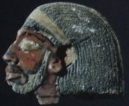- Anyone who touches or eats the carcass of an unclean animal becomes ritually unclean. (Leviticus 11)
- Anyone who touches or eats the carcass of a clean animal that dies of itself, or is torn by wild animals, becomes ritually unclean. (Leviticus 11:29-31)
- Any article that has come in contact with a ritually unclean object becomes ritually unclean. (Leviticus 11:31-38)
- Menstruous women are ritually unclean. (Leviticus 15:19-24)
- Women after childbirth are ritually unclean. (Leviticus 12:2)
- Anyone with a spreading skin disease is ritually unclean. (Leviticus 13:2-46)
- Any clothing contaminated with a spreading disease is ritually unclean. (Leviticus 13:47-59)
- A house contaminated by a spreading disease is ritually unclean. (Leviticus 14:34-57)
- A man having an abnormal discharge (zab) is ritually unclean. (Leviticus 15:2-15)
- Anyone or anything coming into contact with semen becomes ritually unclean. (Leviticus 15:16-18)
- A woman with an abnormal discharge (zabah) is ritually unclean. (Leviticus 15:19, 25-28)
- A human corpse and anyone who comes near it is ritually unclean. (Numbers 19:11-16)
- The purification water purifies the ritually unclean. (Numbers 19:2-22)
- Those ritually unclean must purify at the appointed time by laundering their clothes and immersing in water. (Leviticus 15:27)
- Those ritually unclean of a spreading skin disease must follow the specified purification procedure. (Leviticus 14:2-32)
- Those unclean of a spreading skin disease must shave off all their hair. (Leviticus 14:9)
- Those unclean of a spreading skin disease must be easily distinguishable. (Leviticus 13:45)
- The ashes of the red heifer are to be used in ritual purification. (Numbers 19:2-9)

Hebrew Israelite Online Resource | Know Ye Not?
The phrase “know ye not” or rather, "Didn't You Know" is used 15 times in the English New Testament. This site examines what it is the writers felt important that should have been understood by the early HEBREW ASSEMBLIES.